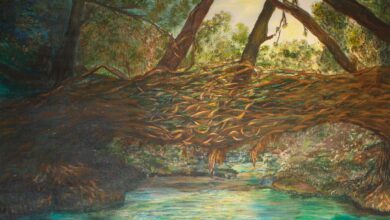Green warrior on REDD mission
On its 10th anniversary, Tambor Lyngdoh’s Synjuk that initiated UN’s REDD+ project in EKH is spreading wings to other districts, state


When one sees the pristine beauty of the Sacred Grove at Mawphlang, one cannot but thank Tambor Lyngdoh, a local conservationist, who has contributed immensely to the preservation of the forests in the area.
From rejuvenating ponds to preserving and protecting the greens in the area, Lyngdoh has come a long way. Now, the Ka Synjuk ki Hima Arliang Wah Umiam Mawphlang Welfare Society, or the Synjuk in short, a non-governmental initiative started by Lyngdoh a decade back, is extending its support to rejuvenate the ecosystem in other parts of the state and beyond.
The UN-aided REDD+ project, which was implemented by the Synjuk years back, was introduced in Ri Bhoi and Manipur as part of the extension programme in 2018. Last December, it was introduced in Tura with the assistance of the Synjuk.
“The goal of the project is to develop a strong community representation to take up the REDD+ project initiative in order to reduce emissions from deforestation and forest degradation,” said Lyngdoh.
The Synjuk will be the active coordinator in all of the projects and will try to get sponsors from interested institutions and companies. It is working on pro bono basis and the majority of the project will be prefunded by other sources.
On the feasibility of the REDD+ project in other parts of the state and the North East, Lyngdoh said in this region, communities are custodians of forests and natural resources. “Wherever people hold a sense of mutual benefit from the forest, the project will work well. The forest depends on people for protection and growth and people depend on the forest for life and environmental services,” he explained.
Awareness is a crucial part of the project. Lyngdoh, who started environment conservation works when he was a teenager, had taken up extensive awareness programmes before embarking on preservation and protection process. In an earlier interview with the reporter, the green warrior had stressed the need for educating people about the importance of preservation and their role in doing so.
Under the extended project too, the first initiative will be thorough awareness programmes “so that community people can understand the benefits and challenges of the project”.
Lyngdoh is always enthusiastic about taking visitors around Mawphlang and explaining the importance of community forests and how they can be protected.
When asked why REDD+ took so long to spread its wings to other districts and state, Lyngdoh said, “It’s not about time, it’s about how the foundation is laid. It is important to have a firm understanding of the basis of the programme and to see how it unfolds in the communities on the ground before expansion… The number of participants (in the new project) will depend on the area of project and the number of villages who choose to take part in the programmes.”
Currently, the state government does not play any role in the project and it will be similar in other areas. “However, we do work closely with the state government through the Wildlife Department, Biodiversity Division, Social Forestry of the Forest Department, and other agencies to share information and provide space for meetings and training for the community participants,” he informed.
A decade of Synjuk
The Synjuk will complete 10 years on June 15 and in a decade, it has worked with 10 indigenous Khasi territories, called Hima, involving 84 villages, and conserved 15,217 hectares of forests. The project area was 27,139 hectares. It had initiated one of the first REDD+ projects in the North East that is being managed and implemented by indigenous communities. The Synjuk has worked with 7,400 households, 70% of which are below poverty line, to bring about a perceptible change in the ecosystem, thus setting a precedence for the rest to follow.
Though the celebration of the decade-old journey will be tepid owing to the ongoing pandemic, there will be no interruption in the preservation work because “more needs to be done to protect the biodiversity in the North East”, Lyngdoh said.
~ Team Sunday Monitor




